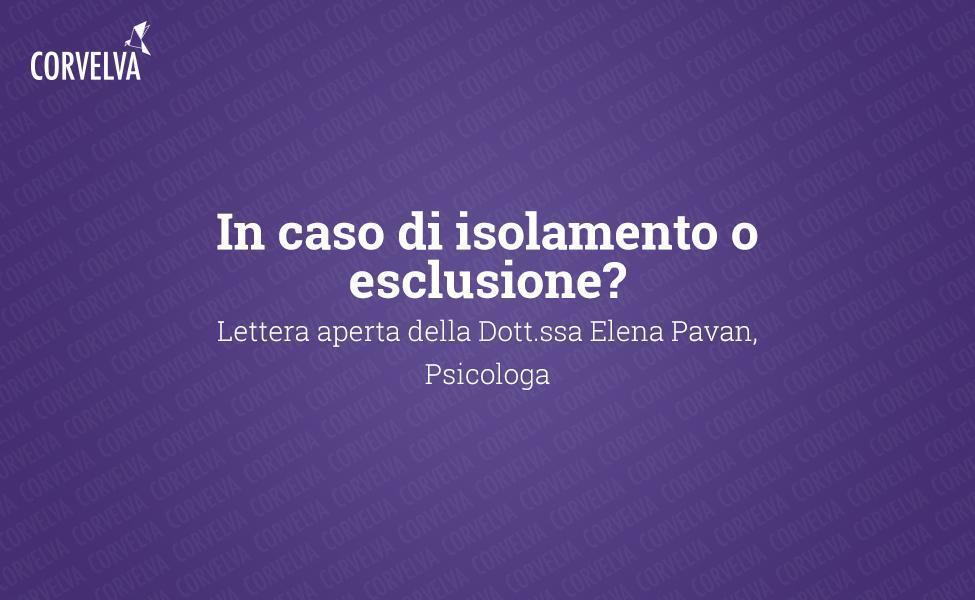In the event of isolation or exclusion? Open letter from Dr. Elena Pavan, Psychologist

Many parents are asking how to behave in case of isolation or discrimination of our children for the vaccination issue and I feel like sharing some thoughts with you.
We assume that our children will always be at risk and we do not think only of vaccines, they can be "targeted" because they wear glasses, for a different skin color, because they are slower at school, less good in some sports , because overweight ... because shy ... so my reflection wants to be general beyond the reason why our children are in difficulty.
The main question is: "How can we parents deal with the situation?"
Each case should be evaluated on its own because there are many components that can come into play, but here are some general tips
- Reflect in his emotions
Mirroring is always the first step to do: tell the child that we understand how he feels, imagine the anger and disappointment he is feeling, we see him, perhaps by telling us about similar episodes that have happened to us too. Our understanding is fundamental to make him understand that he is not the only one to feel certain feelings and he is not alone, because mom or dad share his emotion. - Avoid replacing the child
At the same time, however, we must avoid replacing him in managing the situation, for example by going to talk with the children who exclude him or with mothers (unless it is a serious episode of arrogance, of course), because the message that we would pass on to our son is that he is not able to solve the issue on his own but he always needs external help and in this way he would feel even more insecure. Also because we can't always be there to protect him. - Encourage him to find a solution
We can sit next to him, let him tell us what happened, then we can invite him to hypothesize any scenarios ('let's see, what could you do'?), Without posing as 'teachers' who already know the solution from above, but trying to ask the question as a research together, asking questions but letting him come up with possible strategies, because it is right that he find the way out by himself. - Don't over-dramatize
The parent should not amplify certain experiences of the child too much: this does not mean minimizing or being indifferent to his feelings, but keep in mind that children sometimes exaggerate in their reactions and can make it a drama even for a small refusal, especially if they are not been used to enduring defeat. So it is better not to amplify his catastrophism, but always maintain a calm and reassuring attitude. - Teach him that you can't always have everything
The child must also learn that there are likes and dislikes and you cannot always be accepted by everyone and share everything with everyone: it would be nice, of course, but in real life it happens that we cannot always get what we want, the conflict experiences are physiological and one must learn to survive rejection. - Invite a few companions home
Let's offer them to invite some of the children of the group to their home, if we are on good terms with their parents, or help them create a healthy social group to play, do their homework or have a snack together: the one-to-one relationship promotes knowledge, complicity , sharing, breaking down barriers. - Let me reflect on it and learn from it
Refusal can be an important experience for his training: once the moment of tears and anger has passed, it is right that he himself should think about it. Inside he might be aware of some of his behaviors to avoid, just as he could understand that that companion is not a true friend because true friends do not behave in this way; can learn to distinguish which types of mates are best and which characteristics of a child are related to his. These are all teachings that help to grow and, why not, to make the right selection among friendships without feeling obliged to make the 'sheep of a flock'.
As you can see, these tips are based on the main concept of sharing reality and truth with our children. Naturally as parents we must ensure that certain acts of discrimination are not carried out by adults ... in this case our direct intervention becomes indispensable.
Don't talk "to" your kids,
take their faces in your hands
and talk to them.
(Leo Buscaglia)
Doctor Elena Pavan

